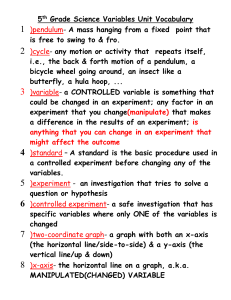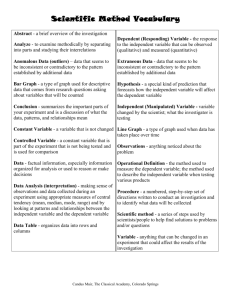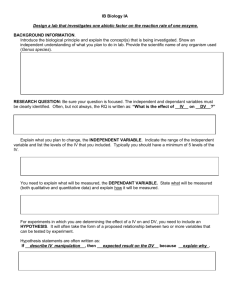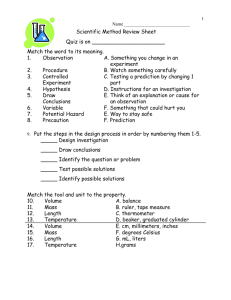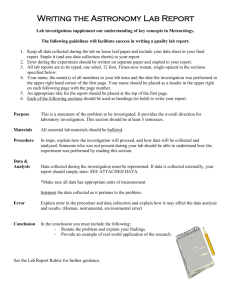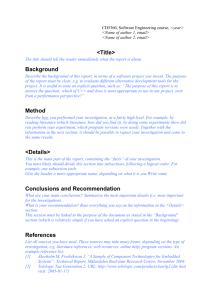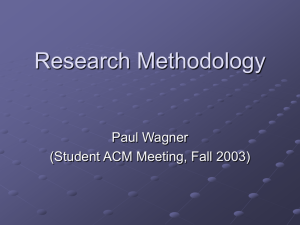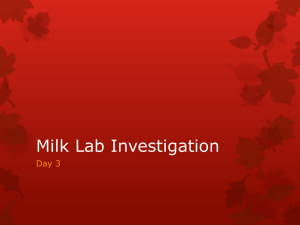Nature of Science Vocabulary: Chapters 1 & 2
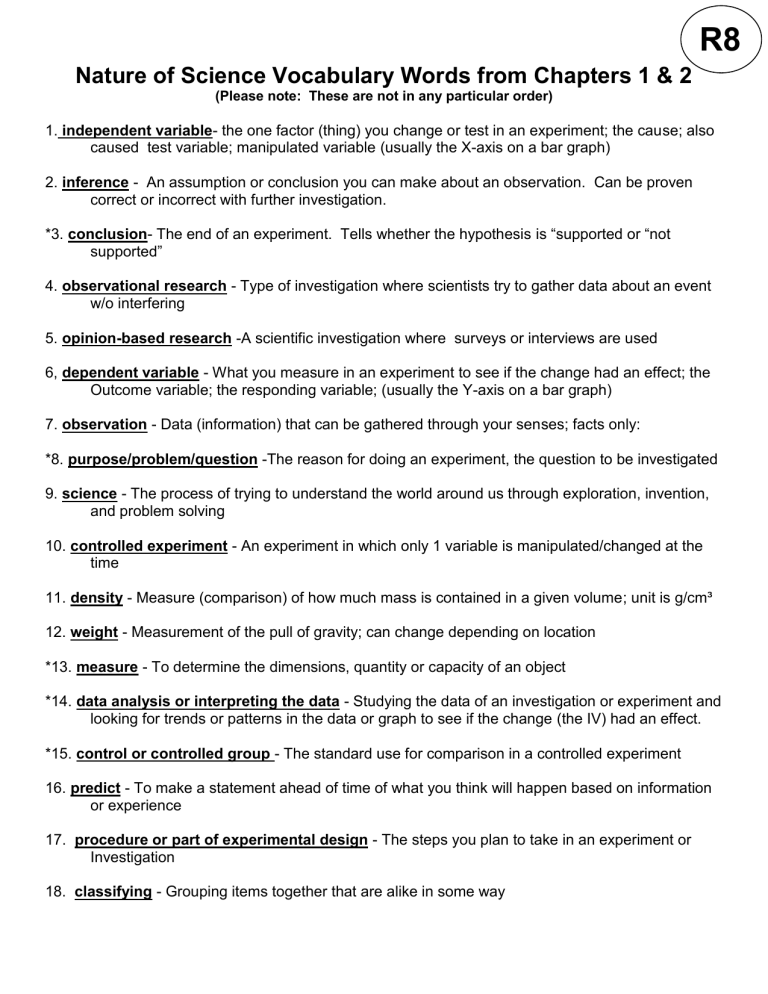
R8
Nature of Science Vocabulary Words from Chapters 1 & 2
(Please note: These are not in any particular order)
1.
independent variable - the one factor (thing) you change or test in an experiment; the cause; also caused test variable; manipulated variable (usually the X-axis on a bar graph)
2. inference - An assumption or conclusion you can make about an observation. Can be proven correct or incorrect with further investigation.
*3. conclusion - The end of an experiment. Tells whether the hypothesis is “supported or “not supported”
4. observational research - Type of investigation where scientists try to gather data about an event w/o interfering
5. opinion-based research -A scientific investigation where surveys or interviews are used
6, dependent variable - What you measure in an experiment to see if the change had an effect; the
Outcome variable; the responding variable; (usually the Y-axis on a bar graph)
7. observation - Data (information) that can be gathered through your senses; facts only:
*8. purpose/problem/question -The reason for doing an experiment, the question to be investigated
9. science - The process of trying to understand the world around us through exploration, invention, and problem solving
10. controlled experiment - An experiment in which only 1 variable is manipulated/changed at the time
11. density - Measure (comparison) of how much mass is contained in a given volume; unit is g/cm³
12. weight - Measurement of the pull of gravity; can change depending on location
*13. measure - To determine the dimensions, quantity or capacity of an object
*14. data analysis or interpreting the data - Studying the data of an investigation or experiment and looking for trends or patterns in the data or graph to see if the change (the IV) had an effect.
*15. control or controlled group - The standard use for comparison in a controlled experiment
16. predict - To make a statement ahead of time of what you think will happen based on information or experience
17. procedure or part of experimental design - The steps you plan to take in an experiment or
Investigation
18. classifying - Grouping items together that are alike in some way
19. scientific inquiry - All the ways scientific problems can be solved; Diverse ways scientists study the natural world and propose explanations based on the evidence they gather
20. hypothesis - A possible answer to a scientific question that is stated in measurable terms
21. mass - Amount of matter in an object; does not change with your location
22. data/data collection - The result of your experimentation (facts, figures, and other evidence) that you usually record on a chart and then make a graph
23. qualitative observations or qualitative data - Descriptions that cannot be expressed using numbers, but instead describe with words
24. quantitative observations or quantitative data – describes using numbers or amounts.
*25 . evaluation - Looking back over an investigation or experiment to see if there were mistakes, biases, or flaws in the design; To reflect on how well the experiment worked (Does it needs to be revised, repeated?); Asking yourself if anyone could replicate this experiment and get the same results
26. volume – amount of space an object occupies
27. variable - all of the factors that can affect an experiment
*28. controlled variables/constants - all of the factors in an experiment that must stay the same so that you can find out if the change (the IV or test variable) had an effect
2 9 .
.
e t t h i i c s rules that enable people to know right from wrong
30. bias – personal opinion; slanted toward one’s own opinion
31. personal bias - when a person’s likes or dislikes influence he or she thinks about something
32. cultural bias – When the culture in which a person grows up affects the way that person thinks
33. experimental bias - a mistake in the design of an investigation that makes a certain result more likely
34. scientific theory - set of statements developed to explain a group of facts or events, especially one that has been repeatedly tested or is widely accepted; used to make predictions about natural events or facts and can change as new technology or new investigations give new information.
35. scientific law - A statement that describes unchangeable relationships among facts and events and tells how something in nature always behaves (or acts) under certain conditions
* * n o t t l l i i s t t e d i i n t t h e b o o k o r r p o s s i i b l l y l l i i s t t e d w i i t t h a d i i f f f f e r r e n t t p h r r a s e .
.
F o r r e x a m p l l e
– c o n t t r r o l l i i s n o t t g i i v e n , , b u t t c o n t t r r o l l l l e d g r r o u p i i s .
.
C o n s t t a n t t s i i s n o t t g i i v e n , , b u t t c o n t t r r o l l l l e d v a r r i i a b l l e s a r r e

